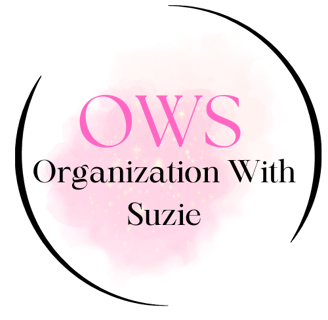Organization With Suzie
Decluttering and Organizing Your Home: A Guide for Individuals with ADHD
HOME ORGANIZATION
Suzanne Roberts Lukowsky
2/24/20254 min read


Understanding ADHD: Definition and Characteristics
Attention Deficit Hyperactivity Disorder (ADHD) is a neurodevelopmental disorder that affects both children and adults, characterized by patterns of inattention, hyperactivity, and impulsivity. According to the American Psychiatric Association (2025), individuals with ADHD may struggle with tasks that require sustained attention and organization, which can significantly impact their daily lives. Symptoms can manifest in various ways, including difficulty following instructions, forgetfulness in daily activities, and a tendency to lose items necessary for tasks and activities.
The defining features of ADHD include inattention, which can present as careless mistakes or an inability to stay focused, hyperactivity, characterized by excessive movement or the inability to remain seated, and impulsivity, leading to hasty actions without prior reflection. Research indicates that these symptoms can vary widely among individuals, resulting in challenges unique to each person. For example, while some individuals may be predominantly inattentive, others may exhibit more hyperactive-impulsive behaviors (Barkley, 2015).
The prevalence of ADHD is notable, with studies indicating that approximately 5% of children and 2.5% of adults are diagnosed with the disorder worldwide (Thomas et al., 2015). Consequently, individuals with ADHD often encounter difficulties when attempting to maintain an organized home environment. The challenges extend beyond simple clutter; the neurocognitive aspects of ADHD can hinder planning, executing, and following through with organizational tasks, resulting in overwhelming feelings associated with disarray. This can create a cyclical effect, where clutter exacerbates ADHD symptoms, leading to increased stress and difficulty concentrating.
Understanding the intricacies of ADHD is essential in providing a framework for addressing organization challenges, especially in the home. Tailored strategies and support systems can help individuals mitigate the impact of ADHD on their ability to declutter and maintain an organized space, ultimately enhancing their quality of life.
Everyday Techniques for Effective Decluttering
As an individual with adult ADHD, I understand that decluttering can pose significant challenges. However, implementing specific techniques can greatly improve this process. One approach that I found very effective is the timer-based method, which encourages working in short, focused bursts. Setting a timer for 10-15 minutes allows individuals to concentrate fully on a specific decluttering task without feeling overwhelmed. Once the timer goes off, a short break of 5 minutes can be taken to recharge. This cycle can be repeated, creating a balanced mixture of productivity and rest, helping maintain focus throughout the decluttering process.
Another practical technique involves the use of visual cues and checklists. Visual organization tools, such as color-coded bins or labeled boxes, can provide immediate visual clarity about where items belong. Creating a checklist of specific areas to declutter can also provide a structured path forward. As individuals check off each completed task, it fosters a sense of accomplishment and motivation to continue. Adapting the use of digital tools, such as apps or icons, can further support visual learners by allowing them to interact with their decluttering goals in a way that resonates personally.
Establishing designated areas for various items is another great technique that enhances organization and reduces clutter. This involves assigning specific locations for similar items, such as books, clothing, or office supplies, to streamline the decluttering process. Utilizing storage solutions, such as containers or shelves, can help in maintaining these designated areas, making it easier to find and return items to their proper place. Moreover, regularly revisiting these areas to reassess organization can help adapt to any changing needs, ensuring that the home remains orderly over time.
Overcoming Emotional Barriers: Managing Stress and Overwhelm
Decluttering can often evoke a range of emotional responses, particularly among individuals with ADHD. The presence of clutter in one's home can lead to feelings of anxiety, overwhelm, and even frustration, making the decluttering process seem insurmountable. Researchers have identified the emotional impact of clutter on mental health, emphasizing that a disorganized environment can exacerbate symptoms of stress and ultimately affect overall well-being.
One effective strategy to combat these emotional barriers is the practice of mindfulness. Mindfulness techniques can help individuals become more aware of their feelings and thoughts during the decluttering process, allowing them to approach tasks with a clearer and calmer mindset. For instance, taking deep breaths, practicing guided imagery, or focusing on the present moment can foster a sense of control over emotions and reduce feelings of overwhelming stress.
Moreover, breaking decluttering tasks into smaller, manageable steps can significantly alleviate anxiety. Instead of tackling an entire room, individuals can set achievable goals, such as decluttering a single drawer or shelf. This gradual approach not only simplifies the process but also provides a sense of accomplishment as tasks are completed. Celebrating these small victories can positively impact motivation and reduce feelings of inadequacy.
Seeking support from friends, family, or professional organizers can also mitigate emotional challenges. Having someone to share the responsibility can lessen feelings of overwhelm and provide encouragement throughout the process. Additionally, the presence of supportive individuals can create a stress-free atmosphere, making decluttering less daunting.
In some cases, professional help may be necessary, especially if the emotional burden becomes too overwhelming. Therapy can offer valuable coping strategies and support for individuals struggling with anxiety related to clutter. By addressing these emotional barriers, individuals with ADHD can more effectively navigate the decluttering process, leading to a more organized and peaceful living space.
Resources and Support for Individuals with ADHD
This post contains affiliate links. This means that if you click on the link and make a purchase, I receive a commission at no additional cost to you.
For individuals with ADHD, the journey towards decluttering and organizing can often feel discouraging. However, numerous resources are available that can provide support and strategies to facilitate this process effectively. To begin, there are several insightful books authored by experts in the field of ADHD and organization. Titles such as "Organizing Solutions for People with ADHD" by Susan C. Pinsky and "The ADHD Effect on Marriage" by Melissa Orlov can provide valuable perspectives and practical tips for managing clutter and enhancing organization at home.
In addition to literature, various websites are dedicated to helping individuals with ADHD develop organizational skills. Websites like CHADD (Children and Adults with Attention-Deficit/Hyperactivity Disorder) offer a range of resources, including articles, webinars, and forums for support and advice. Moreover, ADHD Coaches Organization provides directories of certified coaches who specialize in helping individuals with ADHD create personalized organization systems that work best for them.
Support groups, whether online or in-person, can also serve as vital resources for individuals with ADHD. Engaging with others who share similar struggles can foster a sense of community and encouragement. Platforms like Meetup and Facebook Groups can connect individuals seeking local ADHD support groups, providing a space for shared experiences and strategies.
Lastly, seeking professional services can significantly impact the decluttering process. Professional organizers trained in ADHD-specific strategies can offer hands-on assistance in transforming living spaces into organized environments. Their expertise can aid individuals in learning to maintain these spaces over time. Utilizing these resources not only empowers individuals with ADHD but also demonstrates that help is available to tackle challenges related to organization and productivity.
Connect With Us
© 2024 - 2025 | Organization With Suzie | All rights reserved.
Join Our Free Newsletter to receive exclusive content and access to VIP resources.
Organization With Suzie


Now Offering Checklists and Self Paced Coaching Programs
